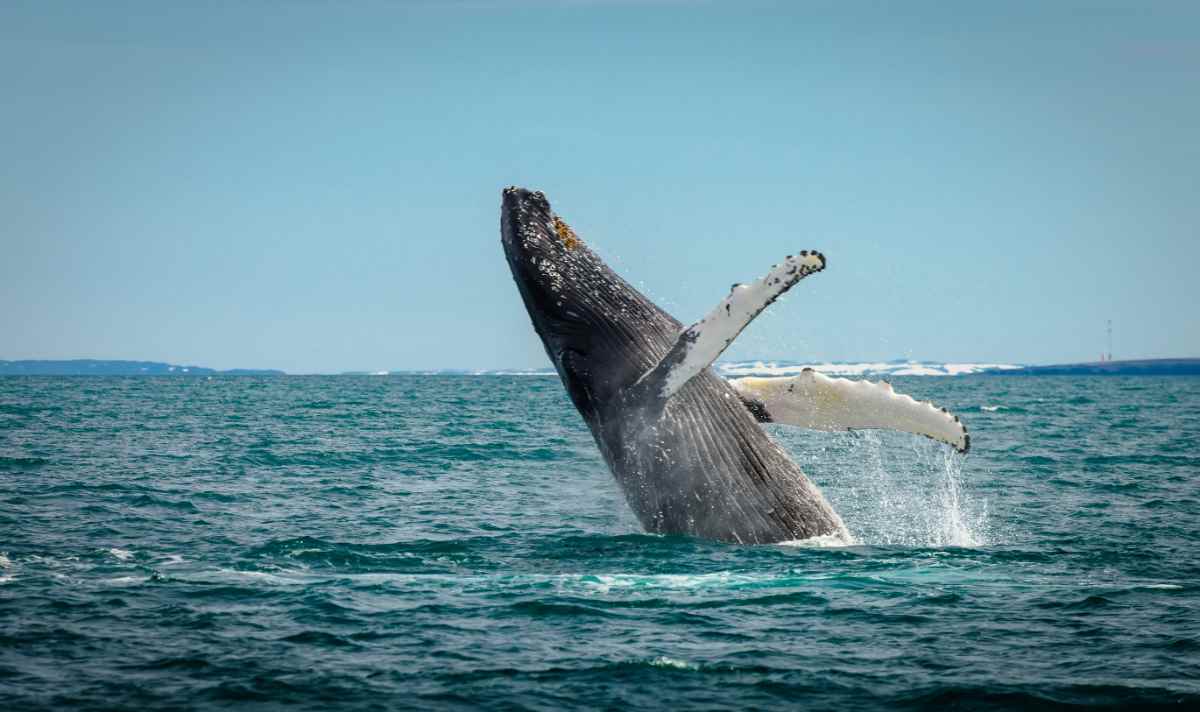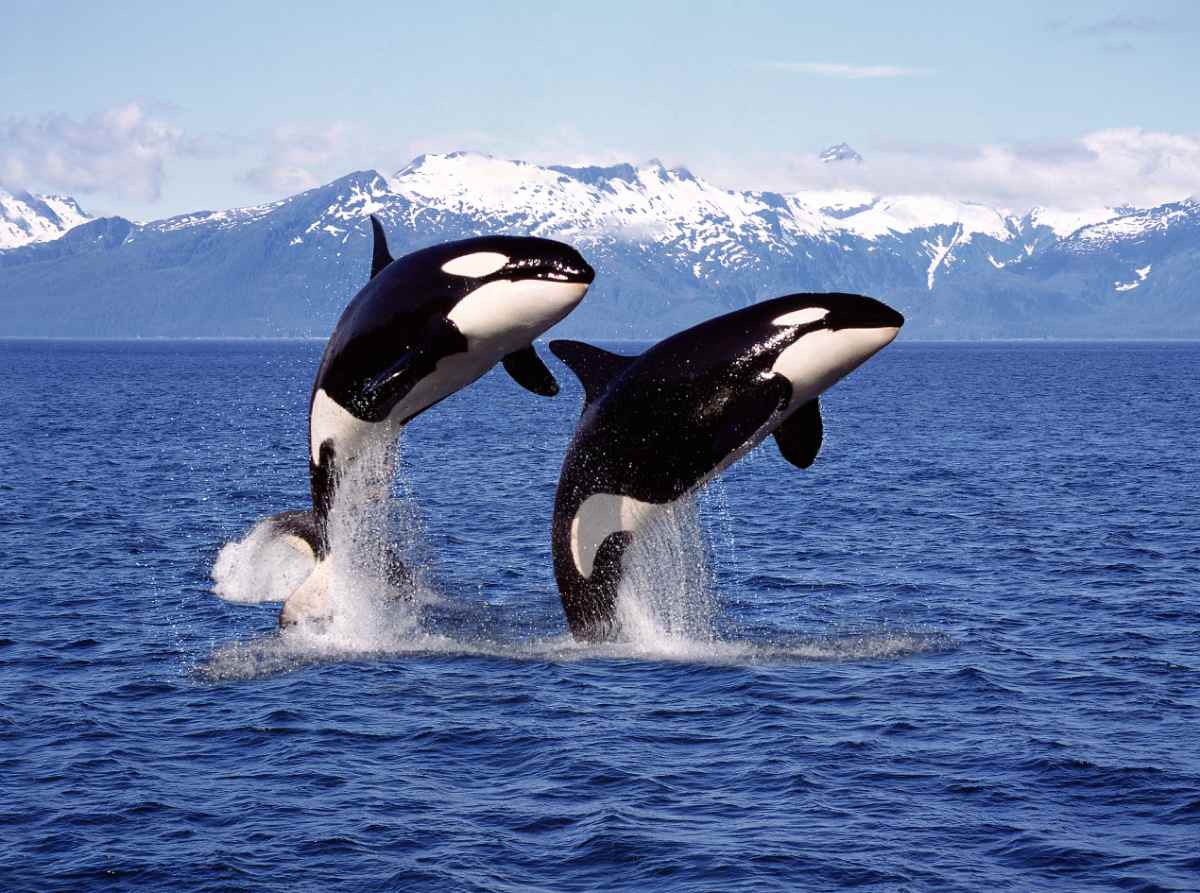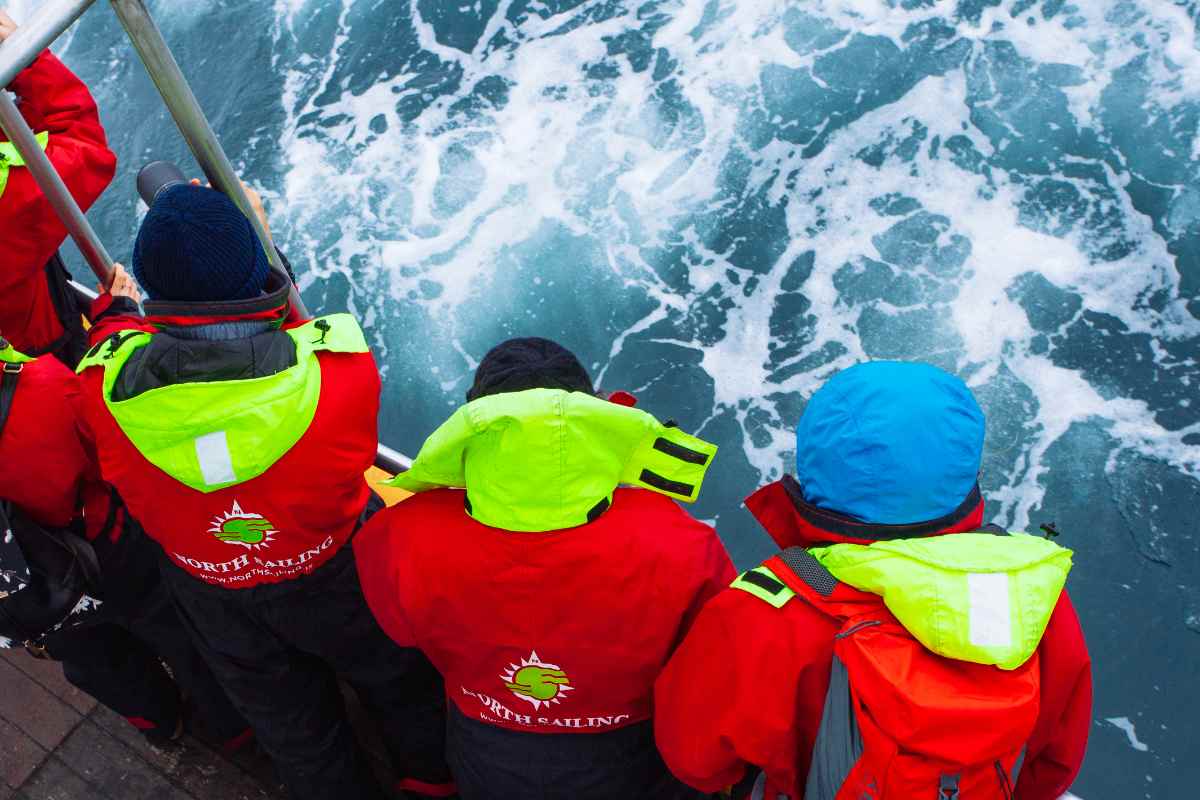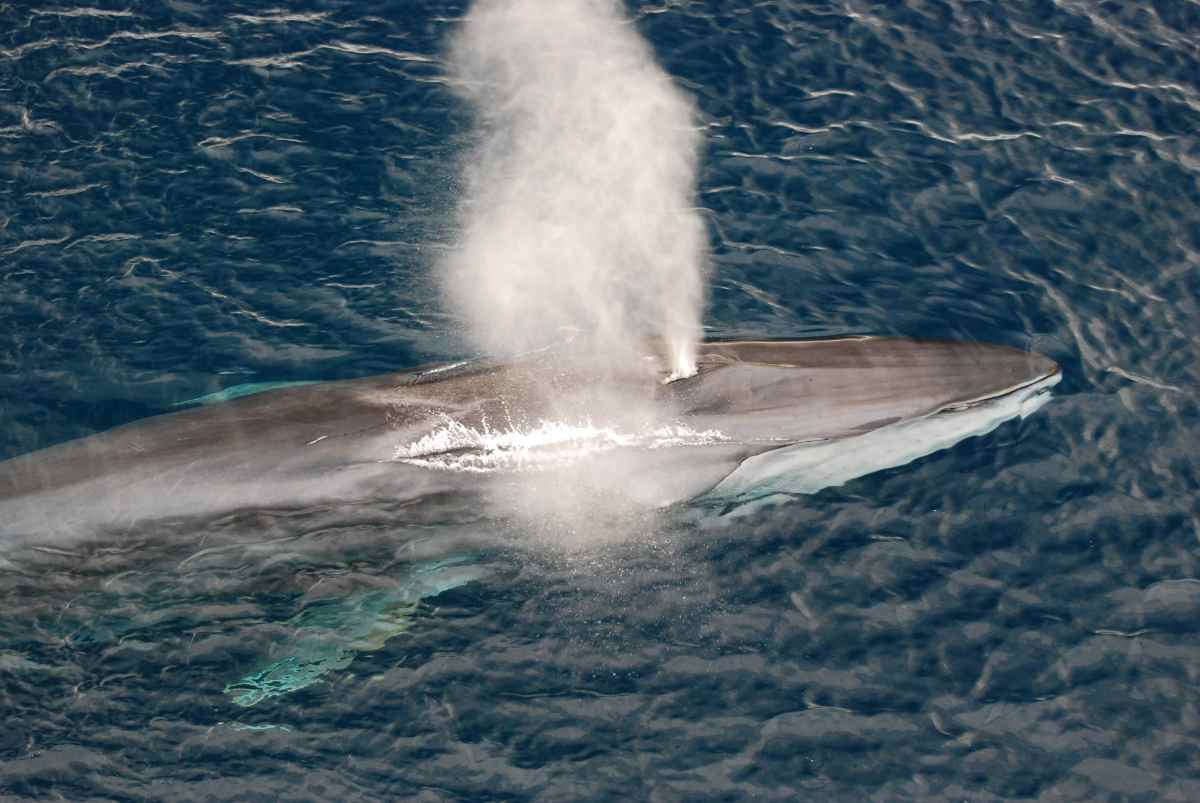08-01-2025

What makes whale watching in Iceland one of the most unforgettable experiences on the planet? Is it the sight of a humpback breaching against a backdrop of glaciers or the chance to witness a 30-meter (100-foot) blue whale gliding through icy waters?
In this guide, we'll explore everything you need to know about whale watching in Iceland, from the best spots like Reykjavik and Húsavík to the ideal seasons for sightings. You'll also discover tips for a safe, eco-friendly tour and how to make the most of this once-in-a-lifetime opportunity. Let's dive into the magic of Iceland's marine giants!
You will find several prime locations for whale-watching tours and sightseeing in Iceland, each with its own unique charm and opportunities to spot whales. Let's take a look at what makes these spots perfect for observing Iceland's majestic marine giants and beyond.
Known as the whale-watching capital of Europe, whale watching in Húsavík, Iceland, boasts a remarkable 97% success rate for sightings. Situated by Skjálfandi Bay, it offers an exceptional spot for observing humpback and minke whales and occasionally blue whales. Visitors can also explore the Húsavík Whale Museum, which provides fascinating insights into marine life, making it a must-visit for nature and wildlife enthusiasts.

The largest town outside Reykjavik, whale watching in Akureyri, Iceland, is popular for its serene location in Eyjafjörður fjord. The fjord's calm waters provide ideal conditions for spotting humpback whales and white-beaked dolphins. Akureyri offers family-friendly tours and serves as a fantastic base for exploring Northern Iceland's stunning landscapes, such as the majestic Godafoss waterfall.
Whale watching in Reykjavik is a unique experience, with tours departing from its charming old harbor. The capital city provides an ideal base for exploring Iceland's Golden Circle and South Coast attractions while enjoying a chance to spot humpback whales, minke whales, and white-beaked dolphins. You can also take part in educational experiences by visiting the Whales of Iceland Museum, which is also the largest whale museum in all of Europe (just so you know).
Our rich marine environment hosts a variety of whale species, which is why it is a prime location for spotting whales. Here are some of the most commonly spotted species in Icelandic waters:
Minke whales, the smallest of the baleen whales, are a frequent sight during whale watching in Iceland. These fascinating creatures grow up to 30 feet (9 meters) long and can weigh around 10 tons. Known for their curious nature, minke whales often approach boats, delighting spectators. They migrate to Icelandic waters in summer, drawn by the abundant small fish and krill, making them a highlight of many tours.

A star attraction on any whale safari in Iceland, humpback whales are easily recognized by their unique body shape and long pectoral fins. These giants can reach up to 56 feet (17 meters) in length and weigh around 40 tons. Known for their acrobatic displays like breaching and fin slapping, humpbacks migrate to Icelandic waters from spring to fall to feed, thrilling visitors with their stunning performances.

Orcas, part of the dolphin family, are a stunning highlight of Iceland's whale watching season, easily recognized by their black-and-white coloration. These impressive predators weigh between 3,628 to 5,442 kilograms (8,000 to 12,000 pounds) and measure up to 27 feet (8 meters), with the largest recorded male reaching 32 feet (10 meters). Often seen in Iceland during winter in herring-rich waters, orcas are famous for their teamwork and complex hunting strategies.

The blue whale, the largest animal on Earth, can grow up to 100 feet (30 meters) long and weigh as much as 200 tons. Feeding on krill, these gentle giants are a rare but awe-inspiring sight when going whale watching in northern Iceland. Skjálfandi Bay offers one of the best chances to spot them during summer, so keep your eyes peeled for their distinctive blue-gray dorsal fin and blow.

Icelandic waters are home to several dolphin species, with the white-beaked dolphin being the most common. Known for their playful and social nature, these dolphins are often seen riding the waves alongside boats, delighting passengers with their antics. Traveling in pods, they feed on fish and squid, making them a lively and frequent sight for visitors exploring Iceland's marine wildlife.

What month is best for whale watching in Iceland? The best time for whale watching in Iceland is during the summer months, particularly from June to August. During this period, migratory whales return to Iceland's nutrient-rich waters, making sightings more frequent and diverse.
The combination of calm seas and favorable weather in summer provides the perfect conditions for an extraordinary whale-watching adventure. During this peak season, you can expect to spot a variety of species, such as:

While summer is the most popular time for whale watching in Iceland, spring (April to early June) and autumn (September to October) offer their own unique charm and opportunities for spotting whales.
These off-season periods provide quieter, more intimate experiences for visitors, and in autumn, you might even combine your trip with the chance to see the Northern Lights dancing across the sky.
With so many options available, finding the best whale-watching tour in Iceland may seem daunting. To help narrow down your choices, here are some of the top-rated tours that offer a memorable and educational experience:
For some of the best whale watching in Iceland, Friends of Moby Dick in Husavik is a must-visit. This small, family-run business is led by experienced whale-watching experts dedicated to creating exceptional experiences for their guests. Operating in Iceland's pristine waters, they offer daily tours tailored to meet your needs, providing an intimate and unforgettable glimpse into the fascinating world of whales.

A whale and puffin tour in Iceland lets you enjoy the best of Reykjavík's wildlife. This tour from Reykjavik departs from the Old Harbour. You'll begin with puffin watching aboard Skúlaskeið (Old Skúli), a shallow-draft oak boat that gets close to puffin nesting islands. Afterward, choose between a Classic or Express whale-watching tour in Faxaflói Bay. Spot minke whales, humpbacks, white-beaked dolphins, and porpoises, all while enjoying comfort and expert-guided insights.
Embark on an unforgettable boat tour from Akureyri, framed by the stunning Súlur mountain. Cruise through the majestic Eyjafjörður, passing the picturesque island of Hrísey and charming coastal towns. Along the way, marvel at Iceland's rich birdlife and encounter the famous 'Eyjafjord Humpback Whales,' known for their spectacular breaches and tail slaps. Spot other marine life, like minke whales and dolphins, while expert guides enhance your experience with fascinating insights.
Whale watching in Iceland is an unforgettable experience, blending excitement with the chance to see magnificent marine life up close. From the moment you board to the end of your journey, here's what you can look forward to.
Tours typically begin at harbors like Reykjavik, Húsavík, or Akureyri, where friendly staff welcome you aboard. After a quick safety briefing, they'll share an overview of the trip. Depending on the operator, you can choose between different vessel types.

Tours usually last 2 to 4 hours, offering plenty of time to reach prime whale-spotting areas and enjoy Iceland's stunning coastal scenery. Longer tours might include extras like bird watching or fishing.
Many tour operators provide thoughtful extras such as:
Whale watching in Iceland offers more than just majestic whales. While out on the water, tourists may spot seals basking on rocky shores or dolphins playfully riding the waves. Bird enthusiasts will love the chance to see puffins during their nesting season, along with other seabirds soaring overhead.

Promoting responsible practices around Iceland, whale-watching companies follow a voluntary code of conduct to protect marine life called the IceWhale's Code. Boats maintain a minimum distance of 984 feet (300 meters) from whales, approach cautiously from the side, and limit vessels near a single whale to two. Tours also avoid disturbing nesting birds or sailing through pods, ensuring minimal environmental impact.
Whale watching in Iceland is an unforgettable experience, but preparation is key for a safe and enjoyable trip. Here's what you need to know:
Whales have played an important role in Icelandic history and culture. Historically, they were vital for survival, providing communities with food and oil. In folklore, whales were often seen as either benevolent giants or mysterious sea creatures, reflecting the close connection between Icelanders and the ocean.
In modern times, Iceland has transitioned from its whaling heritage to becoming a leader in whale-watching tourism. This shift highlights the value of protecting these majestic creatures while balancing cultural history with sustainable practices

Whale season in Iceland runs from April to October, with the summer months (June to August) offering the best chances to see diverse species.
Top whale-watching spots in Iceland include Reykjavik, Húsavík (the whale-watching capital), and Akureyri, offering breathtaking tours in prime whale-rich waters.
Whale-watching tours in Iceland typically cost between $80 and $120 USD (10,000–15,000 ISK), depending on the tour type and location.
Whale watching in Iceland is an unforgettable experience, blending majestic marine life with stunning natural beauty. From humpbacks breaching in serene fjords to playful dolphins and puffins, every moment feels magical. Iceland's rich biodiversity, pristine waters, and expert-led tours make it a top destination for whale enthusiasts.
To make the most of your trip, consider renting a car in Iceland. This allows you to explore the best whale-watching spots, from Reykjavik's harbors to the fjords of Akureyri and Húsavík. Embrace the freedom to discover Iceland's breathtaking landscapes while creating memories that will stay with you forever.